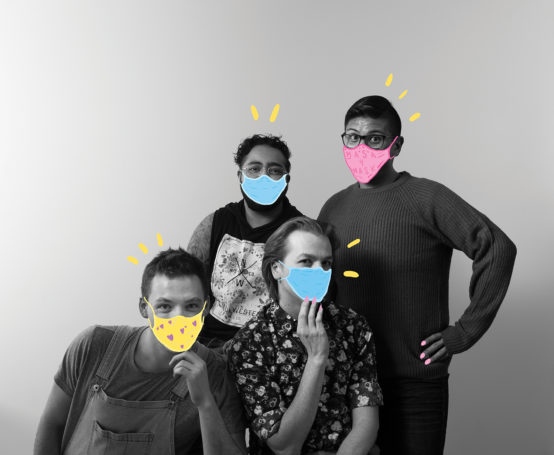November 16, 2020
EMHC is building up healthy citizens … And a healthy community
Brook Biggin remembers the first meeting of the Edmonton Men’s Health Collective (EMHC), what feels like many years and more than a few grey hairs ago, in 2015. “It was in my living room, and I brought a 15-pack of PBR. It was a talented group of people, but none of us really knew what we were getting ourselves into,” he says.
A few years earlier, Biggin was diagnosed with HIV, and began working with a local HIV organization. They did good work, but his own lived experience, as well as digging into the data of how queer men were disproportionately affected, told him that something specific for his community was needed. Mainstream allies are important, Biggin says, but “the work is most impactful when it is driven by the minority communities that are impacted the most.”

Five years later, the collective is going strong, expanding and learning along the way (they now go by EMHC in recognition of those who need their services but don’t identify as men). And they’ve garnered more mainstream funds, from all three levels of government, private industry and Edmonton Community Foundation, which recently funded two different projects thanks to endowment funds set up by its generous donors.
The Health Empowerment Through Active Leadership (HEAL) program equips LGBTQ2S+ community members with important health knowledge, as well as research, advocacy and community health promotion skills. Participants then apply these skills through the development and delivery of their own community health projects, often addressing needs that mainstream organizations might overlook. “Somebody with a high school diploma will come away from the program with a practical skill set they can apply in their everyday life, and community,” Biggin says.
The other project digs deeper within the broader LGBTQ2S+ community to better understand the needs, experiences and assets of marginalized groups, and enhance accessibility to services, volunteer opportunities and leadership opportunities. “Two-spirit people, trans and non-binary community members, queer and trans people of colour, people who are deaf — the grant provided us with funds to be more intentional in helping a broader spectrum of community members, and to understand what more inclusive health services look like for them,” Biggin adds.
It’s an extension of the EMHC’s origin story — to tailor health needs to specific, marginalized communities-within-the-community — and it gives Biggin an emotionally satisfying exit strategy in the next year or so. “Part of being a leader is knowing when it’s time to make space for others,” Biggin says. “The organization has afforded me, and others who were involved early on, chances to learn and grow. There are issues that need to be dealt with today that I don’t believe I’m the right person to address. There are a lot of talented people within our community who can make a big difference but have not been given the opportunity to do so.”